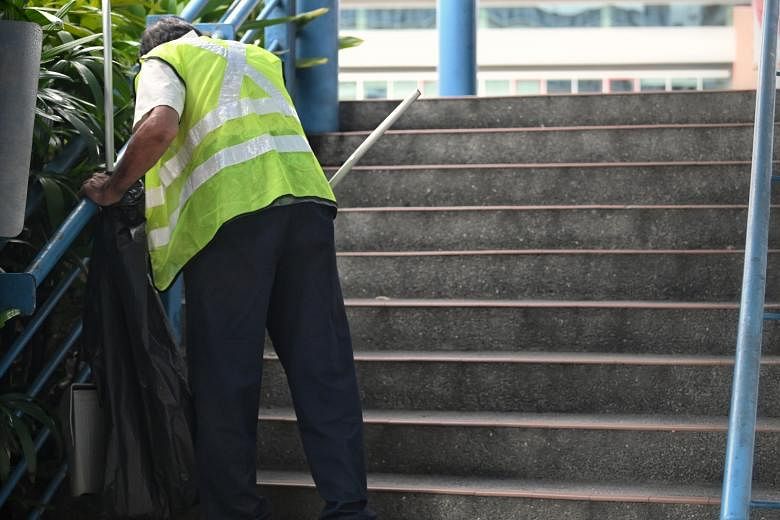SINGAPORE - Helping low-wage workers is a long-term strategy, said labour MP Fahmi Aliman (Marine Parade GRC) in Parliament on Tuesday (March 1) as he called for progressive wages to be extended to more sectors such as strata and facilities management, and pest management.
These two sectors were put forth by the National Trades Union Congress for the implementation of the progressive wage model (PWM), which lays out a wage ladder for workers to get better pay pegged to skills and training.
It has already been implemented in the cleaning, security and landscape sectors, as well as for those in lift and escalator maintenance.
Last year, it was reported that a PWM in strata management could help workers, the majority of whom are not low wage, but whose wages can stagnate due to the tendency for service buyers to choose the cheapest service provider.
Mr Fahmi said it is also vital to look into parallel efforts to complement the PWM.
"In sectors where services are outsourced, we ought to incentivise service buyers from the private sector to adopt outcome-based contracting to ensure that PWM wage increases are sustainable in the long run," he noted.
"Consumers and service buyers should also become more socially responsible, and reject service providers that provide services at low cost, but at the expense of the welfare of such essential service workers."
Mr Fahmi added that there are sufficient opportunities to incentivise service buyers from the private sector to adopt outcome-based contracting.
"I call on the Government to provide funding for trade associations to engage consultants to develop an outcome-based contracts guide," he said.
Fellow labour MP Yeo Wan Ling (Pasir Ris-Punggol GRC) noted that two upcoming PWMs will be in the retail and food services sector. The PWM is significant because the sector includes workers who serve Singaporeans daily and yet earn low wages, she said.
"Some 60 per cent of food services and 45 per cent of retail full-time resident workers are earning at or less than the 20th wage percentile of the local workforce," she said.
"In many international standards among Organisation for Economic Cooperation and Development countries, percentile 20 defines the threshold for low pay. We need to do something about this."
The challenge is that the sector is also very price-sensitive and has thin margins.
"Therein, the concept of PWM is critical as it marries wage increases with productivity increases through upskilling, investments in technology and career pathways," she said.
As the PWM is implemented in more sectors, there will be a greater need to rethink the duration of transitory support new sectors will receive under the Progressive Wage Credit Scheme beyond 2026, Mr Fahmi added.
The scheme provides transitional wage support for employers to adjust to the upcoming mandatory wage increases for lower-wage workers, with the Government co-funding wage increases of eligible resident employees from 2022 to 2026.
Besides lower-wage workers, the labour movement also called for more help to be given to other segments such as gig workers, older workers and migrant workers.
Mr Fahmi highlighted the need for migrant workers to be insured against risks within and beyond the workplace. He called on the Government to mandate or incentivise companies to sponsor the membership fee for their workers to be covered by the NTUC Migrant Workers' Centre, which provides term life insurance for members.
He also urged the Government to consider mandating the electronic payment of salaries for migrant workers to protect them from exploitation.
Meanwhile, Ms Yeo said more must be done by platforms and firms to support freelance workers, who do not have the protection and benefits that salaried employees enjoy.
"As we look to provide greater protection and welfare benefits for workers in the gig economy, the tripartite partnership must strive to support a healthy diversity of career options and sustainable, dignified livelihoods brought about by the gig economy," she said.
Mr Heng Chee How (Jalan Besar GRC) also advocated strengthening the retirement adequacy of older workers, by ensuring that employers' Central Provident Fund (CPF) contributions keep pace with wages and enabling older workers to stay employed.
This can be done by providing appropriate affordable senior daycare services so workers do not have to leave the workforce to care for their elderly family members.
Older workers also need to be reskilled, especially in roles that are evolving, so that they can continue to work when firms have transformed.
"We need to focus attention on jobs and occupations employing significant numbers of older workers (who) we know will be impacted significantly by fast changes in technology," Mr Heng said.
"In this regard, we must pay special attention to the subset of such jobs and occupations that our switch to a low-carbon economy will put additional pressure on."


